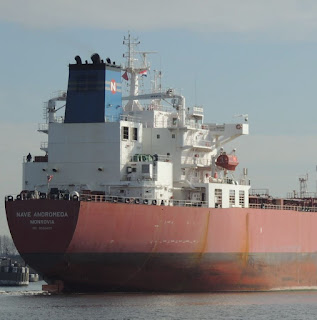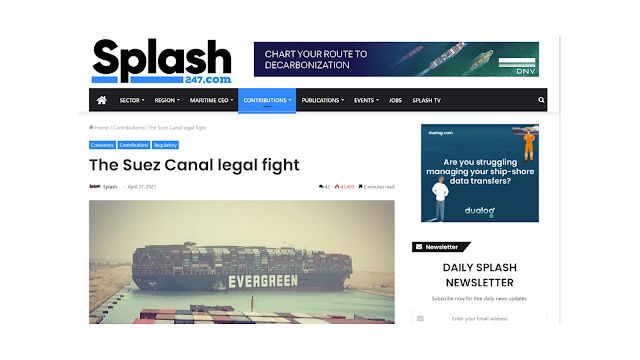Nave Andromeda - Terror Alert on the UK Coast
questions must be asked and lessons learned
It sounded
dramatic and the media duly ramped it. The essential ingredients were all in
the mix - a ruthless band of shady foreign hijackers (surely terrorists if not
mere pirates?), a shady foreign tanker under a shady Liberian flag, and a SpecialForces operation. But when the facts were revealed there was no injury, no
loss of life and no damage to property, and neither the Isle of Wight,
Portsmouth nor Southampton were subjected to an apocalyptic attack. The drama
proved to be nothing more than a woeful tale of human despair in the all too
familiar shape of lost souls seeking a better life.
We should be grateful for the professionalism of the special forces, but we must also question why it happened at all. Firstly, there are questions about the timescale of the military response and, secondly, there are questions about why stowaways were still on a ship that was a few miles from British shores when it had visited both Spanish and French ports earlier in its voyage.
In the English
channel, just off the Isle of Wight, a mayday was sent at 09:00hrs on Sunday 25
October from the Nave Andromeda, a 228 metre, 75,000 tonne deadweight
tanker. The alarm was first raised by local authorities shortly after 10:00hrs,
but it was 19:30hrs before decisive action was taken by the SBS (Special BoatService), the British navy’s special forces unit. Why did it take the SBS over
nine hours to board the ship? Was this strategic, using the cover of darkness,
or was it due to a delay in receiving a go-ahead? At what time was approval for action issued
through the combination of the UK government’s COBRA security committee, Ben
Wallace - Defence Secretary, and Priti Patel - Home Secretary? Did the SBS have
to wait nine hours, or did they receive a rapid green light and subsequently
establish the threat was diminishing sufficiently to allow them to strike when
it suited them?
The
international community continues to fail to establish a practical framework
for the shipping industry to operate under when it finds stowaways on board or
plucks economic migrants from danger in the open seas. Compounding the problem
is the blank refusal of nation states to honour the accepted conventions that
are already in place. If a ship finds stowaways on board it is obliged to
declare their presence to the authorities at the first practical port on its
route. In this case, the Nave Andromeda declared them to the Spanish
authorities in Las Palmas but was refused permission to berth and disembark
their unwanted guests. It tried again at the next port of call, the Donges
refinery on the west coast of France, close to Saint-Nazaire, and was denied
once more.
Stowaways
usually reveal themselves within a day or two, usually because they are cold,
hungry and in need of medical assistance, and it seems this is what happened,
shortly after leaving Nigerian waters and around a week before the ship was due
to arrive in Las Palmas, in the Spanish administered Canary Isles. Yet Spain
washed it hands of responsibility, as did France, effectively passing the buck
to the next country of call, England, in what is both an object lesson and a
damning indictment of a hopelessly flawed system.
Unlike the USA,
which has robust maritime security protocols established by the Department of
Homeland Security and administered by a combination of the US Coast Guard and
US Customs & Border Protection services, the UK has an open-door policy
with zero vetting and pre-inspection. Any foreign vessel can enter and berth at
any UK port without any prior security checks being carried out whatsoever. A
ship merely presents documents, in advance, to a UK shipping agent, who
pre-registers the ship with the port authority and local customs office, and
nineteen times out of twenty the customs office pre-clears the ship for port
entry and does not follow up with a physical inspection once it is on the
berth. The UK Customs & Excise Authority used to routinely inspect ships on
arrival, but budget cuts and a lack of manpower has consigned this to history.
The only practical form of security vetting is now left to chance, with the
vague hope that perhaps a sharp-minded shipping agent might sense
something is not quite right with a ship, its owners, master, crew or
accompanying documents. Even closer to the point of arrival, this unwanted and
unwarranted responsibility might fall to a pilot who has just boarded the ship,
or a tugboat crew who are assisting it into port.
The Nave Andromeda sailed from Nigeria on October 5 and with the first leg of its voyage amounting to around 2400NM, should have been due to arrive in Las Palmas on or around October 13. It was a further twelve days, on October 25, before the UK authorities first became aware of the ship, after receiving a mayday and reports of erratic circling just a few miles off the Isle of Wight. Seemingly unknown to the UK, the ship and its stowaways had been reviewed and dealt with by both the Spanish and French authorities. There are also reports that the ship tried to enlist the Portuguese government’s help, which was also apparently denied.
By refusing permission for the ship to berth and refusing to accept the handover of the stowaways, both the Spanish and French authorities demonstrated a deliberate disregard for the accepted conventions. They effectively just said, “no, we won’t accept responsibility”, and sent the ship on its way. In today’s world of mass and instant communication, there was a deafening silence, presumably because they did not want to draw attention to their flouting of the convention, preferring to sweep the matter under the carpet and look away. It is difficult to believe, and accept, in this climate of heightened global security risks and awareness of the need for cooperation between friendly countries and allies, that Spain, France and Portugal effectively passed the buck without, it would seem, feeling any need or responsibility to inform those further down the line. What is the point of friendly governments establishing internationally accepted conventions if signatories feel no moral imperative to honour them? Compounding their worthlessness is the casual acceptance that they are unenforceable and carry no penalty or consequence when they are flouted. It is deeply worrying to find neighbouring countries, who profess to share common values, appearing to cover up the fact that they are sending potential security problems your way - and keeping quiet about it...
The Nave Andromeda incident is just part of an ongoing problem, for another day, for a time when the world will hopefully act with responsibility and solidarity. Meanwhile, UK waters and the consequent national security implications continue to be dealt with through the lazy attitude of out of sight and out of mind. Maritime security in the UK is weak. The back door has been left open by a combination of underfunding, the lack of a comprehensive plan and political indifference to even considering the need for such a plan. Rear Admiral DrChris Parry commented in a BBC interview, “it could be terrorists next...” And he’s right! A well planned attack could see a terrorist controlled ship not just offshore but actually moored in a UK port before the slightest hint of suspicion is raised.
The UK was lucky this time. They were not terrorists, just poor migrants. Will it be as lucky next time, if faced with maritime terrorists? I don’t think so.
Carlos Luxul
The climactic disaster scenario of my novel, The Ocean Dove, is rooted in plausibility and, just like the Nave Andromeda, could so easily happen - though I sincerely hope it doesn’t. Meanwhile, back in real life, these events are timely reminders of severe vulnerability if the world fails to act on maritime security.






Comments
Post a Comment